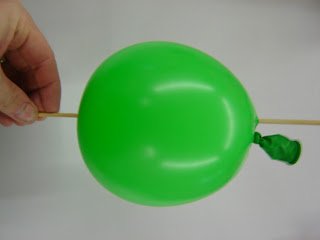Balloon Kebabs
Density and pressure effects are explored using a simple visual demonstration.
Ingredients:
balloons
wooden kebab skewers
wooden kebab skewers
Instructions
1. Blow up the balloons (not full) and tie them off.
2. Challenge your audience to make a 'balloon kebab' – to insert the wooden skewer all the way through the balloon without popping it. Let a few people have a try – they will invariably try to insert the skewer fairly slowly through the side, and the balloon will pop.
2. Challenge your audience to make a 'balloon kebab' – to insert the wooden skewer all the way through the balloon without popping it. Let a few people have a try – they will invariably try to insert the skewer fairly slowly through the side, and the balloon will pop.
Show them how physics can make the trick work:
1. Start by lining up the skewer point with the darker patch on the balloon, opposite the tie end. Gently push the skewer through. You may find that a twisting motion works best.
2. Once the skewer is through one side, push it gently through the balloon until the point of the skewer is at the opposite end – the darker area around the tie.
3. Insert the skewer tip gently through the soft part of the balloon where the tie is – again use the twisting motion if it helps. Voila! – you have made a balloon kebab!
2. Once the skewer is through one side, push it gently through the balloon until the point of the skewer is at the opposite end – the darker area around the tie.
3. Insert the skewer tip gently through the soft part of the balloon where the tie is – again use the twisting motion if it helps. Voila! – you have made a balloon kebab!
See video at:- http://m.youtube.com/watch?v=jwE4oSv7Qds
How Does it Work?
This trick works through an understanding of surface properties. A balloon is formed by inserting air into a flexible thin rubber sheet. Most of the balloon is stretched evenly, but there are two points where the rubber is least stretched – and thus there is the lowest surface tension. These correspond to the tied section and the darker patch at the opposite side of the balloon – in fact the darker colour indicates that the balloon is less stretched over that region. Most of the balloon is under high tension, so attempting to push the skewer through just makes the balloon pop. But at the low tension sections it is possible to make a small hole without breaking the overall surface of the balloon.
Tips for Success
This trick works best with round balloons (rather than long skinny ones) – mainly so that the kebab skewers can fit! Don't blow up the balloon too much or it will pop even if you do it correctly. Make sure the skewer ends are fairly sharp – blunt skewers are more likely to pop the balloon.
You may find that your balloons sometimes burst even if you follow the instructions. The audience will enjoy the entertainment so just laugh it off and try again!
You may find that your balloons sometimes burst even if you follow the instructions. The audience will enjoy the entertainment so just laugh it off and try again!
Source:- http://www.physics.org/interact/physics-to-go/balloon-kebabs/index.html

No comments:
Post a Comment